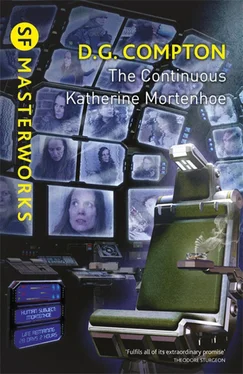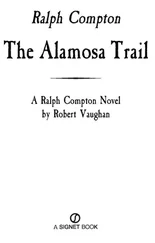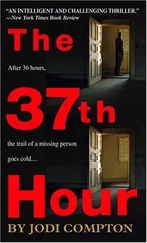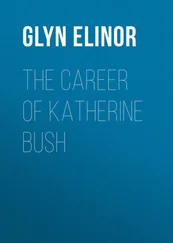‘We’re together,’ I said. You said such things to the sick.
I’d found car keys on a row of neatly labeled hooks in a sort of chauffeur’s office. It wasn’t my fault that the office door had sort of busted when I sort of leaned on it. I started up, switched on the lights, and drove carefully out of the garage. Going up the ramp must have broken some sort of ray, for an alarm bell started ringing distantly in the house behind us. I slowed, making sure Vincent heard the bell.
‘Don’t worry,’ I said to him, to Katherine. ‘He’ll think twice before he calls the police. He won’t want trouble any more than we do.’ And a word from Vincent, dear Vincent, in his best cocktail manner, would clinch the matter.
I drove down the avenue between the high hedges, and out onto the thruway. For a while Katherine stayed awake, watching the tarmac our lights created and let slip endlessly by. Then I reclined her seat and she slept again. I drove on through the night, not fast, taking each hour as it came.
Dawn found us maybe a hundred miles on, at about the limit — without a substation — of my transmitting range. Tied to Vincent by bonds of ether, I turned off at the next intersection and began working my way back, using country lanes. There had been few other motorists, and none of them had done other than hurtle by, rocking us with the wind of their passing. As soon as the light was strong enough I drew into a gateway by a field, switched off, and stopped. First it was very quiet. Then, as my ears adjusted, it was noisy again: noisy with the most turned-on set of birds I’d ever heard. I watched the sun come up over a stubbly, undistinguished hillside. After the house, the friends, the life, of Coryton Rondavel it was quite breathtakingly beautiful.
I got out of the car and went for a short walk. The lane dipped abruptly and came to a stream, and a narrow stone bridge. I sat on the parapet, watching a pair of moorhens. I thought about… nothing but the bridge and the stream and the two little birds busy in the rushes. After a time I went back to the car.
Katherine was still asleep. I’d expected to be revolted by the incontinence when it came, and certainly the smell in the enclosed car was bad. All that really worried me, though, was how degraded she’d feel when she woke. I wound down the windows, backed out into the lane, and drove slowly along to the bridge. Then I got out again, slamming the door. She opened her eyes. ‘There’s clothes in the back,’ I said. ‘And your bath is run.’
Then I went away. If Vincent wanted close-ups of her shame he could come and get them himself.
In fact she was admirably composed about the whole affair. She emerged from the car carrying a towel, underclothes, and one of Rondavel’s Margaret’s dresses. ‘You think of everything,’ she said. ‘I don’t expect it’ll fit, but at least it’s got a fancy New York label.’
Her little joke made, it was easy for me to return and help her over the fence. She slithered down the other side into the soft green water meadow. I tried to remember when she had decided to do without her goggles: if the psychiatrists were right it would mark a watershed in our relationship. She laid the dress out on the grass, took off her clogs and socks and fringie outer robe, and went down the bank into the stream. It must have been cold, but she waded out all the same, and dipped herself till she was sitting.
I should have left her to wash in private. But there was an old-masterishness about the scene that I couldn’t resist. The willows, and the gray lichened stones of the steep little bridge, and her robe swirling out in the water around her. Besides, our relationship had never been one of old-fashioned constrictions. To have looked away would have been a denial. We were too close, and far too wise. Not, of course, that all these complicated rationalizations went on in my head as I stood there by the bridge. I stayed because, at the time, I didn’t think of not staying.
If I need further excuse, I can only say that this was obviously the way she saw it too. For she knew I was there, and she took off her robe without fuss or display, and let it float away on the current. It caught on the reeds by the bridge, then whisked free and disappeared under the low stone arch. Her underclothes followed it… Now, the body of a forty-four-year-old woman is supposed not to be beautiful. Even less beautiful, therefore, the body of a frequently paralytic, hallucinating, incontinent forty-four-year-old woman suffering from a terminal syndrome. To deny this assumption is to be accused of ludicrous romanticism. Facts, after all, are facts. So I’ll just claim, and be done with it, that at that time, in that place, I found the sight of Katherine Mortenhoe washing her thighs, her arms, her shoulders, her breasts, to be right. Not beautiful, perhaps, but utterly right. Which has always been, to my mind, as good a definition of beauty as you’ll find.
~ * ~
The water bit into her, coldly purging her. Her trembling was glorious, not a rigor but her body’s innocent reaction to the teeming, sunlit water. Washing herself, she noticed her brown nipples huge with the cold. She didn’t hide them from the strange young man who leaned on the fence and watched. He was more than simply a man and she a woman. They were both of them human and, unreasonably, she found that somehow magnificent. To turn away would have been an insult. So she stayed in the water till she could bear the cold no longer, then waded out and climbed the bank to where she had left the towel. She dressed, and they had breakfast sitting on the grass by the car.
It was a strange meal, stolen in a tablecloth from Coryton Rondavel’s party: rye bread, smoked salmon, beef, pate, a bottle of wine, peaches. When they had finished enough remained for lunch.
‘How much money have you left?’ he asked.
She fetched her handbag from the holdall in the car and counted. After the previous day’s cafe she had only seven pounds sixty. ‘It doesn’t matter,’ he said. ‘I’ve got enough to get us by.’
‘Did you steal some from the house?’
He hesitated, then shook his head. ‘I suppose it was silly, but stealing money seemed somehow wickeder. Besides, I wouldn’t have known where to look.’
‘Then you’ve got money of your own? Nobody’s nobody, you said. Do nobody’s nobodies always have money of their own?’
‘Shall we leave it?’
‘But, Rod—’
‘I said, shall we leave it?’
She looked at him, and left it. She smiled and shrugged, but the exclusion hurt and he knew it did. ‘Katherine…’ He turned away. ‘Katherine, you know nothing about me. Don’t expect so much. And keep your secrets.’
‘I have no secrets, not here, like this.’
‘Well, aren’t you the lucky one.’
He was angry now, and she didn’t blame him. They weren’t children, playing truth or dare. She changed the subject. ‘The police’ll be out looking for the car,’ she said.
‘I told you, Rondavel won’t say a word. Not after last night. He won’t want the publicity.’
She remembered his telling her, but as if in a dream. All the time they had spent in that house had a dreamlike quality. ‘A twenty-thousand-pound car?’
‘Cheap at the price.’
Again things were unsaid, and again she had to press him. ‘You say I wasn’t raped. So what happened last night? What is Mr Rondavel so afraid of?’
‘He… won’t be quite sure. When you’re high enough the distinctions blur.’
But—’
‘Don’t go on, Katherine. I promise you you weren’t touched. So don’t go on.’
There was a different, a gentler exclusion here, one that didn’t hurt. Not that she would have minded the details: they were obviously sexual and the drive to pleasure — no matter how devious — was universal enough. But she was willing to be spared, just because he wanted to spare her.
Читать дальше












